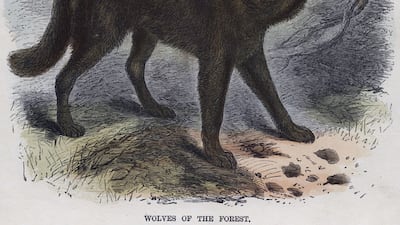Before Britain became the United Kingdom, there were wolves. By all accounts, there were once a tremendous number of them: great packs of wolves feasting on livestock and the occasional traveller. Through a combination of bounty-hunting, trapping and deforestation, wolves became extinct in England sometime during the reign of Henry the VII (1485-1509). In Scotland, the last wolf was reportedly killed in 1680, 27 years before the founding of the UK. In The Wolf Border, Sarah Hall's weather-haunted fifth novel set in an alternative present-day England, an expectant mother is tasked with overseeing the reintroduction of the Grey Wolf at the very moment that the UK ceases to exist.
As far as alternative histories go, this is a subtle one – Scottish independence isn’t exactly Hitler invading Britain. Hall, who finished the novel before Scotland’s No vote last September, uses secession as a backdrop against which she explores the nature of independence.
Twice nominated for the Booker, Hall is among the finest writers of her generation. She was born in Cumbria, the setting for The Wolf Border, and it shows. "Wolf border" is the translation of the Finish word susiraja, which Hall calls "the boundary between the capital region and the rest of the country", suggesting that "everything outside the border is wilderness". Hall is a poet of those outer regions.
In fact, you might be forgiven for thinking that the novel's main character is the land itself, and that the weather, "that most English of subjects", is the plot. Oftentimes, returning to a novel means returning to a story, to characters, but picking up The Wolf Border always felt like returning to an inhabited environment: Hall's evocation of the natural world is that good. And whenever the wolves stalk the page, their alien intelligence delivers an uncanny jolt.
The Wolf Border's human protagonist, Rachel Caine, is herself something of a lone wolf: mildly estranged from her family and her British homeland, she lives at the Chief Joseph reservation in the United States, monitoring wolves. She is content, in her late 30s, attached only to her work. Enter the inscrutable Thomas Pennington, the 11th Earl of Annerdale, who wants to turn a great portion of this huge Cumbrian estate into a reservation for the reintroduction of the Grey Wolf into the English countryside. He wants Rachel to help him realise this dream. "The prerogative of wealth and wilful eccentricity," it is an offer she initially refuses, until an unplanned pregnancy brings her home.
Rachel quickly becomes embroiled in the Cumbrian politics and practical intricacies of reintroducing wolves. Once we're introduced to the Jurassic Park-like foolproof computerised gate keeping the wolves from the outside world, you know there's going to be trouble. The threat of the wolves escaping looms over everything. In the meantime, Rachel becomes romantically involved with the local veterinarian and begins to reconcile with her half-brother, Laurence, whose troubles bring them together in unexpected ways. The burgeoning and nuanced familial love between a sister and brother essentially meeting each other for the first time is deeply affecting.
The Wolf Border is least successful when at its most conventional. Hall half-heartedly sets up a mystery within the Earl's family, for example, and then half-heartedly solves it. It feels as if both author and character shrug this plot off. It's almost unseemly, as if belonging to another book entirely.
In fact, much of the plot begins to pale beside the internal drama of Rachel's pregnancy, and the birth of her son. The Wolf Border ranks among the finest meditations on motherhood that I have ever read. Here is where Hall's themes of nature and freedom find their most potent outlet. Rachel describes and observes her own changing body and temperament as she would the wolves in her care or the seasons outside her cottage. She experiences love on a magnitude that both terrifies her and makes her whole. "To be so out of control emotionally, to have so much and so little control over another living thing." She is new in her own skin, intoxicatingly animal in a way that she can do little to combat. What is true independence in the face of such nature? It must be found within it. She finally submits.
If Hall gives us the wolf as an archetype of intuition and pure nature, then one could almost read The Wolf Border as a modern werewolf myth. It is the story of a human transforming and connecting with something terrifying, animal and true. Motherhood as the ultimate full moon.
Tod Wodicka lives in Berlin. His second novel, The Household Spirit, will be published by Jonathan Cape in June.
The Wolf Border is available on Amazon.

